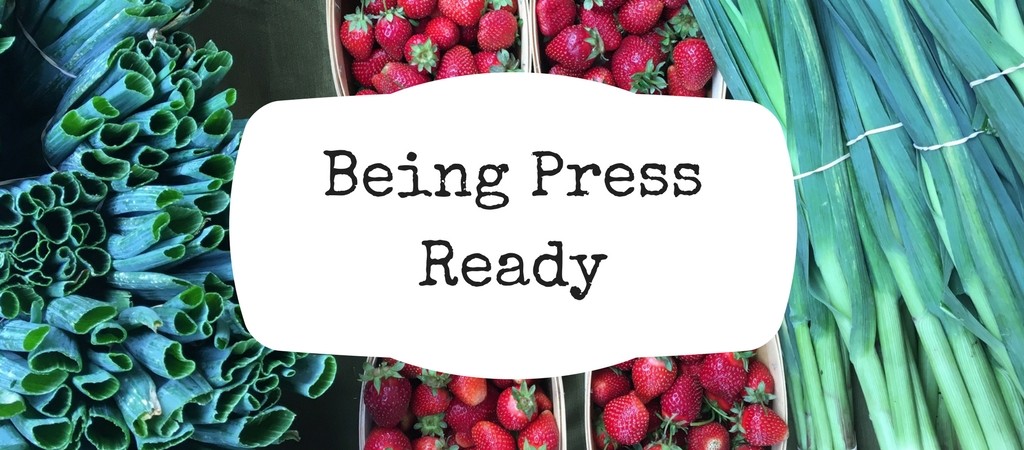
By Phil Easily, Harrisonburg Farmers Market
How to make friends with the news media: feed them.
Newspapers and broadcast media have a voracious appetite. They’re always hungry for content. But you can help because you have what they need and want. You have stories, and stories are their stock in trade.
When I was a reporter…
- I soon learned that I couldn’t initiate every idea by myself. I needed content, story ideas, sources of information. Every day. Every week.
- The press releases that arrived in the mail were like unsolicited junk mail. I might look through them if I was really desperate for a story idea, but I usually just threw them away.
- If a source was on a first-name basis with me, half their battle (and half of mine) was won.
- Those who understood my challenges and needs were valued highly. They seemed to be offering help rather than asking for a favor.
What my favorite sources understood
- I wanted personal stories, stories with a human element. If I were assigned to do a farmers market story I would want to know who their most interesting characters were. Facts and figures always take a back seat to personal stories and a human element.
- When someone asked for or suggested a story on themselves it was awkward for everybody. But when they asked on behalf of a third party I was much more likely to be interested.
- Reporters and their audiences want and need real people, not spokespersons. Even the word “spokesperson” sounds cold and heartless. I’ll bet you can’t say it to yourself and make it sound warm, fuzzy, or compelling.
Cultivate, and go with the seasons
- Organize a list of media contacts. Meet these people in a setting where you aren’t asking them for anything (Chamber of Commerce events, downtown associations, informal networking).
- Reporters and editors like to find (or create) timely themes. In the spring, a time of renewal and beginnings, find your oldest vendor and suggest a theme around how often that vendor has been through these seasonal cycles. Or offer a pair of vendors to compare/contrast…maybe your oldest and youngest. Or think spring weather. Or any connection with the season that someone could hang a story on.
- If mid-summer is work-heavy and labor intensive for vendors, help guide a reporter toward sweat and toil, work patterns, the lifestyle of a farmer, etc.
- In the fall you might suggest ideas that could be framed in the context of wrapping up that part of the yearly cycle. And exploring what farmers and artisans do when the frost comes.
- The dead of winter is a time for planning, repairing, assessing, and taking stock. You might land some stories in the business section of the local newspaper as vendors busy themselves over seed catalogs, financial planning, doing taxes, etc. Folks like stories about entrepreneurs, which is exactly what farmers market producers are.
Don’t put all your eggs in one basket
- Look to local radio (NPR and commercial radio) public service or news segments, local TV, and local newspapers. When your target audience hears the same message coming from different directions, in different forms, they are more likely to remember it, and take it seriously.
- Do the local luncheon circuit. You might make a presentation at a Ruritan lunch that will result in some reporter (guided by an editor who heard you) calling you to pursue a story. It’s easier to network than you might think. Try it.
Think long term. Think big.
- The relationships you develop this year with media people will pay off next year, and the year after.
- Try not to think about what your newspaper/radio/ TV can do for you, rather ask what you can do for them. It will end up good for both of you.
- For many of you the real goal is to bring as many people together around a small set of big ideas—nutritious food, entrepreneurship, sustainability, community, the work ethic, local economics. A goal like that takes time. Be patient.
- Have confidence in the value of your market, and the work towards building a healthy, sustainable community. That confidence, even when unspoken, is contagious. News media people will want to help. They pretend to be cynical but the reality is that they too would like to make this a better world.
About Phil Easily
 Phil Easley grew up in Southwestern Ohio where he spent his teenage years working on neighboring farms. He spent thirty years as a radio and tv journalist covering political, education, business and human interest beats. Recently retired from the Senior Audio Engineer position at the language-learning company Rosetta Stone, he now works on the five-acre flower farm he owns with Mary Jo Swartzendruber, serves on the board of the Harrisonburg Farmers Market, and pursues interests in music and the Japanese art of Aikido.
Phil Easley grew up in Southwestern Ohio where he spent his teenage years working on neighboring farms. He spent thirty years as a radio and tv journalist covering political, education, business and human interest beats. Recently retired from the Senior Audio Engineer position at the language-learning company Rosetta Stone, he now works on the five-acre flower farm he owns with Mary Jo Swartzendruber, serves on the board of the Harrisonburg Farmers Market, and pursues interests in music and the Japanese art of Aikido.
